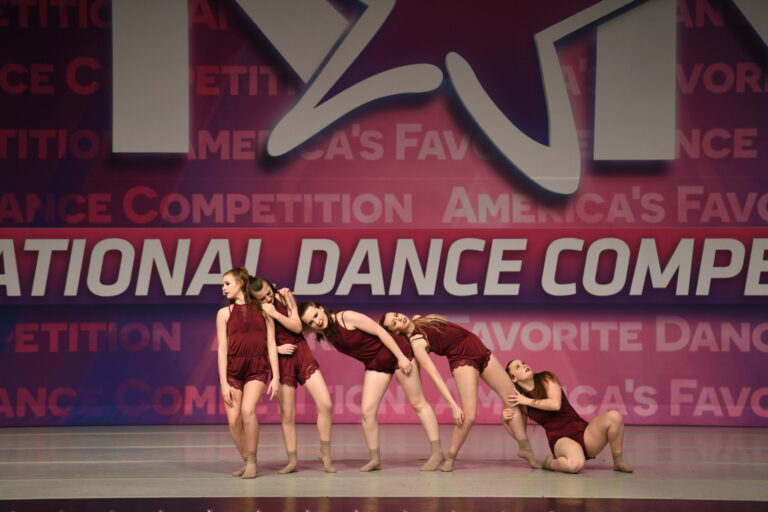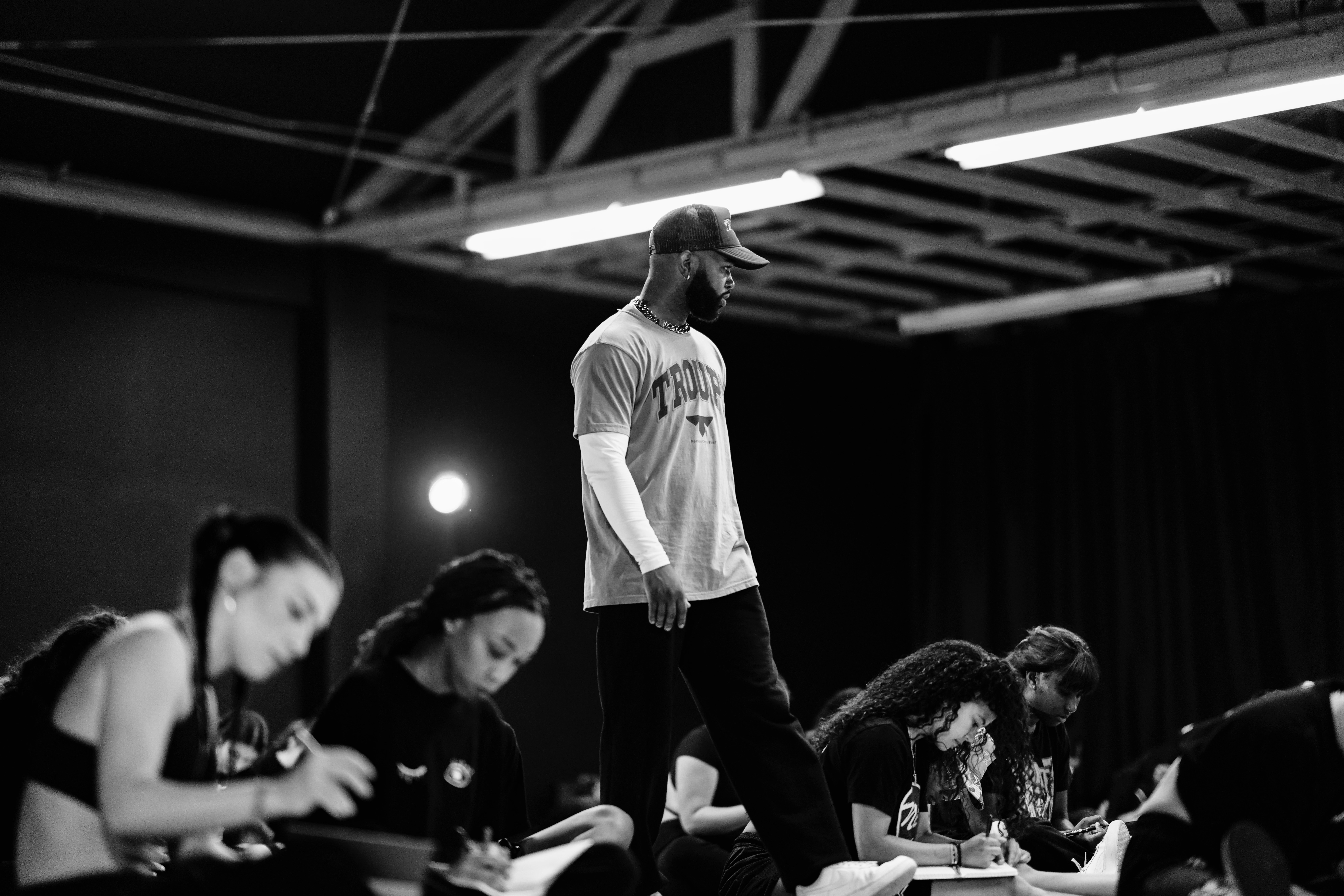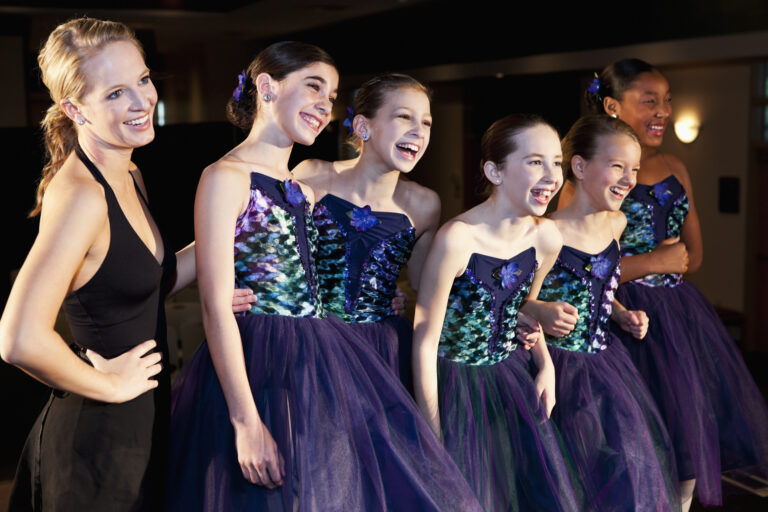
Walking into Rhythm Dance Center, the eye is instantly captivated with color and whimsy. Each wall has a different graphic wallpaper adorned with photo collages from the latest recitals; every chair is upholstered in yet another fun pattern; chandeliers hang in neon colors; and in the homework lounge, the mantra “Be Amazing” beckons in large glittered print. But there is one thing noticeably absent from all the eye candy: trophies.
“We have never been caught up in winning,” explains Becca Moore, owner and one half of the force behind the popular studio just outside Atlanta, where fun and creativity reign, and there is a class for everyone, from recreational dancer to pre-professional. “It is more about process and growing. We set goals, of course, but not necessarily to win first place. Besides, we don’t have room for trophies to collect dust here, so we donate them and talk to the kids about that.”
Moore and her partner Dani Rosenberg decided to open a studio together when they were barely out of their teens. Now in its 23rd year, Rhythm Dance Center has grown from 100 students to more than 1,000, with professional graduates such as “So You Think You Can Dance” winner Melanie Moore and students who go on to Ivy League educations. Bursting at the seams with dance bags piling up everywhere on any given afternoon, the large five-studio home they built 15 years ago is barely large enough to contain them.
 Photo by Laurie Sermos
Photo by Laurie Sermos
The two were only 19 and 22 when they signed their first lease. They had gained valuable experience at the studio where they danced in high school, eventually teaching and helping with scheduling and costume ordering. And they did have the guidance of business-minded parents who taught them about customer service. But they credit their success in large part to learning from their mistakes and following their passions. After more than two decades in business, doing nearly every aspect of it together, the pair is so in sync they not only finish each other’s sentences, they often speak whole sentences for one another. “We have very few disagreements,” says Moore. “We see eye to eye on almost everything, so we are rarely in conflict.”
Some of their mistakes have been more expensive than others. “The vending machine,” groans Moore. Early on, they took out a lease on a vending machine, seeing it as a good way to make a little extra cash. Unfortunately, it never worked, and the fine print was not in their favor. “We had to pay to get out of that situation,” says Rosenberg.
“Or remember when we tried to be too cool?” They laugh trying to explain a period when they had put pressure on themselves to teach the trendiest jazz moves. That didn’t last long. Moore elaborates, “Our faculty keeps current and is amazing at it. We stick to teaching the more classic jazz technique we are good at.”
Though they may joke about their trial-and-error business approach, the truth is that it takes a great deal of foresight and planning to run a studio of this size. These women clearly have that down. They hold partial staff meetings every Monday to make sure everyone is on the same page, and they have informational meetings in advance of recitals for parents of the six casts, plus auditions for the performing company to clearly lay out expectations and head off misunderstandings.
 Photo by Laurie Sermos
Photo by Laurie Sermos
But perhaps the biggest challenge at this stage of Rhythm’s existence is having enough space to accommodate growing enrollment. They have begun renting a separate office space—which both claim enthusiastically was the best decision they ever made; now they can get work done without constant interruption—and a sixth studio nearby to give them time to mull over expansion plans. There is talk of adding on to their current building, but that would require permits and major planning within the community. “There’s no question we have to expand,” says Moore. “It’s just a question of how.”
They take two yearly retreats with members of their faculty, many of whom are homegrown, to plan and prepare for recitals. And they have made friends with other studio owners in their area and around the country. They enjoy grabbing a drink with others from the greater Atlanta area when they end up taking their schools to the same conventions. And they’ve developed close friendships with studio owners farther afield, such as Christy Curtis of CC & Co. Dance Complex in Raleigh, North Carolina, whom they met at an event in Hawaii seven years ago. “We probably exchange a text with Christy once a week,” says Moore.
“We started talking by the pool and found our studios are similar in size and thought process,” says Rosenberg. “It is nice to hear how another studio deals with the same issues. Christy once shared a spreadsheet she uses for her recital tech week, and we adopted that immediately. We have even taken social trips together—it’s like therapy.”
Indeed, running a studio the size of Rhythm affords very little time off. “We are willing to stay at work until 2 am because we are not committed to other things,” says Moore. “This has always come first.”
Rosenberg nods, acknowledging the sacrifices and admitting it would be an impossible endeavor without the support of each other. “This is our family. It may be an unconventional lifestyle, but it suits me. I’m very independent, and I got this insane work ethic from my mom.”


